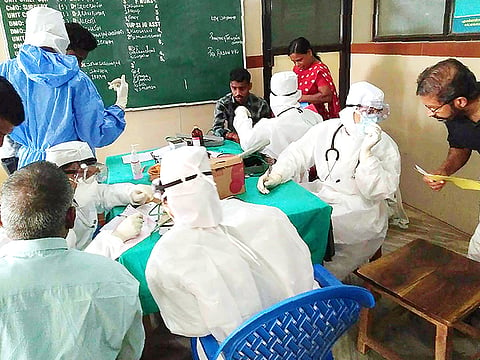Kerala confirms dozen have Nipah virus, 10 dead
Battle to contain Nipah outbreak has been complicated further by cases of dengue in parts of state

Thiruvananthapuram: The Kerala government on Tuesday confirmed that a dozen people in the state had contracted the dreaded Nipah virus, and that 10 of them were dead.
The deceased include two siblings in Malappuram district, Mohammad Sadiq and Mohammad Salih, both in their twenties, and a nurse identified as Lini Sajeesh, who contracted the disease by her proximity to patients as part of her duties.
State health minister K.K. Shailaja said two of those who were still battling the disease were in a critical condition in the Kozhikode Medical College Hospital.
The state government’s clarification on the deaths came after results were available of the blood samples sent for testing at the National Virology Institute in Pune.
Two of the 10 deaths occurred on Tuesday morning, with the deceased being identified as Madampally M. Rajan, 47 and Ashokan, a native of Nadapuram.
The latter had been initially undergoing treatment at the EMS Hospital in Perambra where the deceased brothers were also being treated.
While the state government is battling the health crisis triggered by the Nipah virus, the situation has been complicated further by cases of dengue fever in different parts of the state.
Unlike the Nipah virus, which has been reported predominantly from Kozhikode and Malappuram districts, dengue cases have been reported from multiple districts.
Plantation owners advised
Health department officials across the state have been pressed into service to visit individual houses and advise residents to ensure there are no water puddles that can lead to a spike in mosquitoes.
Rubber plantation owners have been advised to ensure that the cups used to collect latex are kept upside down after the day’s tapping is over so that mosquitoes don’t breed in them.
Besides the health scare itself, Kerala also has the fear that its tourism industry may be seriously affected by news of the Nipah virus.
No country has yet issued a travel advisory regarding the matter, but the state is worried whether the news itself will adversely affect its short-term tourism prospects, particularly at a time when it is recovering from the impact of a liquor ban imposed by the previous United Democratic Front government.
While taking measures to tackle the spread of the virus, the state government is also burdened with advice from quacks on social media.
Some of them advise people not to eat jack fruit and mango since these could be infected by bats.
About Nipah virus
Nipah is a virus that is first believed to have appeared in Malaysia and Singapore at the end of the 20th century, and initially found to be affecting domestic animals including dogs, cats, goats, horses and pigs.
■ However, it also affects human beings, and is infectious.
■ It is caused by a ribonucleic acid virus of the family Paramyxoviridae, and is closely related to the Hendra virus.
■ The disease is spread through fruit bats which are known to be natural hosts of both the Nipah and Hendra viruses. Scientists believe that the virus is present in the bat saliva, bat faeces and perhaps even in their birthing fluids.
■ Humans may contract the disease when they come in direct contact with the excretions or secretions of affected domestic animals or infected bats.
■ Some of the symptoms of affected persons include fever, headache, drowsiness, and mental confusion.
■ There are no readily effective vaccines for the infection, but preventive measures are highly advised. Since bats are believed to be a key causative factor, preventing farm animals from eating fruits bitten by bats is advised.
■ Medical staff treating infected patients should necessarily wear masks and gloves and thoroughly wash their hands.
Sign up for the Daily Briefing
Get the latest news and updates straight to your inbox


